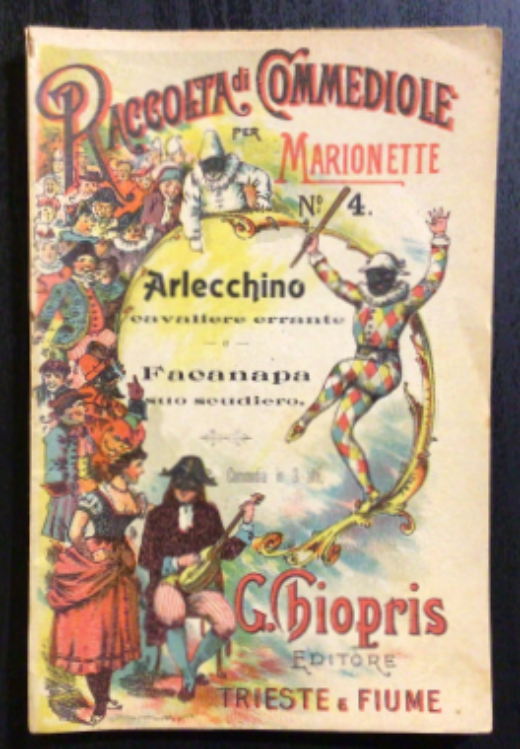
Printed
39 pages
Arlecchino cavaliere errante e Facanapa suo scudiere
Arlecchino cavaliere errante e Facanapa suo scudiere (Harlequin the wandering knight and Facanapa his horseman) is part of a series of texts written for puppets, Raccolta di commediole, and released by G. Chiopris, a publishing house from Trieste, in around 1900; these texts were intended for a family audience. The theme of this play echoes the story of Miguel de Cervantes’ Don Quixote and Sancho Panza. Indeed, they share many similarities: the peasant becomes horseman, the lover goes from a maid to a lady, the knight fights imaginary enemies, and the horseman, who has a more rational role, gets caught up in his master’s frenzy. In this play, Arlecchino portrays the wandering knight whilst retaining his role as Arlecchino Battocchio, his traditional role from the Commedia dell’arte.
A servant believes himself to be a knight
Arlecchino, on horseback, and Facanapa, on a donkey, are strolling, when they meet a man wearing a hairshirt. Arlecchino thinks that he is a wizard and his enemy, and challenges him. The man tells him that, if he wins, Arlecchino will have to follow him everywhere. Arlecchino answers that if he is the one to win, the man will have to assist the noble Colombina, his beloved. Arlecchino loses the duel, and is forced to follow the man to a castle where he is locked up with Facanapa. The owner explains that he is not a wizard but the marquis Francesco Del Ponte, back from a pilgrimage. He assures that Arlecchino is not a knight but the servant Arlecchino Battocchio, and that Facanapa is a peasant, and he tells them to stop their madness. Arlecchino is sad, angry and hungry, but the marquis says that he will not give them food until they stop fooling around. Later, Arlecchino meets the castle elderly maid who recognises him. She had met him when he was a child, but he does not believe that. After fighting over a piece of bread, Arlecchino and Facanapa manage to escape and reach the woods. There, they fight against imaginary enemies made up by Arlecchino’s hallucinations. Arlecchino fiercely fights a herd of pigs, wounding and killing them. Guards arrive and throw themselves at him. Arlecchino, who thinks he has been turned into a donkey, starts braying. Facanapa concludes, and says that a servant can become both a knight and a donkey.
Publications and translations
Arlecchino cavaliere errante e Facanapa suo scudiere : commedia in tre atti. Trieste ; Fiume : G. Chiopris, s. d.